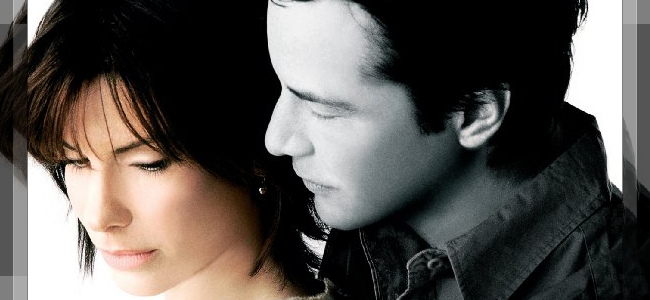One evening, we’d been discussing things like causal loops and other time paradoxes, which spurred Ferny to mention The Lake House. Our curiosity was piqued, so Ferny, DM, her partner and I decided to watch it for the first time. Well, we did. We watched it. That is a thing that happened.
I’m not here to talk about whether The Lake House is a good or bad movie as a whole. Is it a bad film? I don’t know. Maybe not. I certainly didn’t feel a strong negative reaction to it. By the end of the night, I didn’t regret having watched it.
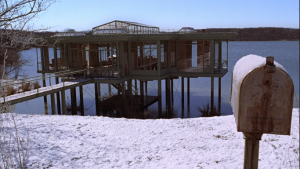 Warner Bros
Warner Bros The titular house and the strangely non-titular mailbox.
It may be important to establish that they can actually see the little red flag on the mailbox rise and fall when the mail has been sent or delivered, so we know that this thing has set rules. Really, the mailbox itself is pretty logical, so long as we disregard any questions as to how it works (which we should). I have no intent on contemplating hypotheticals such as “What would happen if Kate put a bomb in the mailbox and sent it into the past?” (although, seriously what would happen?). The problem with the film is the inconsistency with which time travel is presented. You’d think that someone writing a script or novel or game or what-have-you that revolves around time travel would take special care to laying out rules for how time works in their prospective universe. Unfortunately, it doesn’t usually seem to happen that way. And so, it didn’t happen that way with this movie.
It should go without saying that this article will contain massive spoilers.
1. Ontological Paradoxes
The reason why we started watching The Lake House is because we were under the impression that it was a story about ontological paradoxes, also known as causal loops or bootstrap paradoxes. An ontological paradox involves two events, one in the past and one in the future, which are caused by each other, thus forming a loop with no discernible origin point. An example would be this: You receive a journal full of instructions for building a time machine. Months later, following the instructions, you have built the time machine. You use it in order to go back in time, copy the instructions into a fresh, blank journal, and leave that journal for your younger self. The result is that the instructions have no discernible origin – how does the knowledge for building a time machine even exist if the only reason why you have it is because you merely copied the knowledge from a book that you wrote by copying a book that you wrote by copying a book, ad infinitum? These things are really interesting to think about.
Anyway, having watched this movie, I found only one arguable instance of an ontological paradox, and a mild one at that. In the beginning of the film, Kate mentions in her letter that the previous occupant left behind a box of stuff in the attic. Much later, when Alex decides to take leave of the house, he seems to remember this and intentionally places a box full of stuff in the attic for her to find in the future. Thus, the box is there because he knows that, in the future, the box is supposed to be there. It’s a self-fulfilling loop.
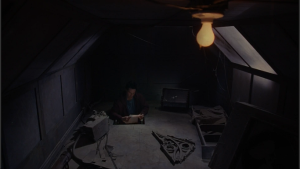 Warner Bros
Warner Bros This attic is the first and last place where time seems logical in this movie.
Furthermore…
2. Timeline Stability
In the same, first letter in which Kate mentions the box in the attic, she also mentions a trail of pawprints running down the walkway. After having read the letter, while painting the walkway in the past, Alex witnesses his dog, Jack, running through the paint… leaving pawprints behind. This isn’t really an ontological paradox because nothing Kate said influenced the dog to run through the paint, but it’s important to note here because it follows the same logic: Someone from the future mentions an event which occurred in the past, and it doesn’t change history or cause a butterfly effect or something.
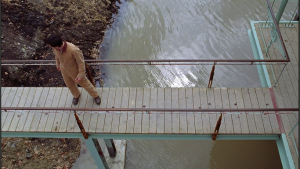 Warner Bros
Warner Bros The ruin caused by these pawprints is an accurate representation of how stable time is in this universe.
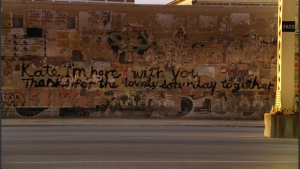 Warner Bros
Warner Bros It’s unclear whether Alex’s disembodied hand appeared in the future and wrote on this wall.
3. Changing History
Perhaps the writers were trying to misdirect the audience by making us believe that history can’t be changed, so that maybe we wouldn’t accurately predict the ending.
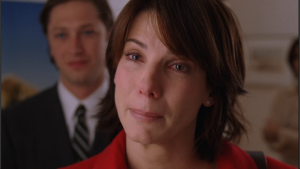 Warner Bros
Warner Bros My goofy prediction was that the movie would end with both Alex and Kate standing at each others’ graves.
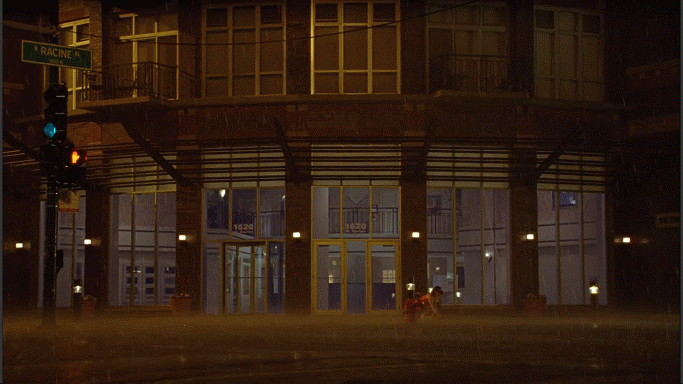 Warner Bros
Warner Bros Just imagine what may have happened if she’d been a little bit to the right.
The best theory that I heard – and I apologize, for I cannot remember who among us proposed it – was that perhaps the tree was there all along, but Kate could not see it, because she needed to make the comment about the lack of trees in order to prompt Alex to plant the tree in the first place. In other words, if Kate hadn’t complained about the lack of trees, then Alex would never have planted that tree there.
This theory, though, however reasonable it may seem, is utterly shattered in the third act of the film.
Long after Kate has abandoned Alex because he “stood her up” for a dinner reservation which he set for a date two years ahead of his time, Kate is with her boyfriend – you know, the kind of guy in these movies who is always the unreasonably wrong choice – talking to an architect about building a house. The architect turns out to be Alex’s brother, who, in the course of conversation, lets loose that Alex died in a bus accident. A bus accident which Kate witnessed toward the beginning of the movie.
 Warner Bros
Warner Bros Aw shit, I already used this pic for a bad joke. Maybe you won’t notice if I just use it again.
But wait a minute.
Alex did die at the beginning of the movie… We saw it. Kate saw it. She still has the memory of him dying. She literally just talked to his brother, who confirmed his death. That’s… completely different than a tree just appearing, because maybe some magical force prevented you from seeing it in order to fulfill destiny or some shit. Time has literally changed here. And, again, Kate is the only person who knows. If she went back to talk to the architect again, he would undoubtedly not remember the conversation.
But… if time has truly changed, and Alex never died… then Kate would have no reason to send her final letter, preventing Alex from dying, because he would never have died in the first place. This is what is known as a grandfather paradox. If someone went back in time and killed her own grandfather, she could never have been born, and thus could never travel back and kill her own grandfather. Perhaps more appropriately for our case, if one were to go back in time and kill Hitler, then the urge to kill Hitler would never exist, and thus the individual would never have the reason to go back in time and commit the deed. It’s a paradox because it contradicts itself.
There are two possible ways in which this could happen. The first, far sillier option is that there is only one timeline, and Kate and Alex’s actions are actually changing history… somehow. It’s illogical when you think about it, but it seems to be the concept which most laypeople default to understanding, probably because the human mind is built to be very linear. I don’t doubt that the writers of this film (and, for that matter, the writers of the original Korean version) probably gave no thought to the logistics of time travel when putting together this romantic drama. The second, more rational option is that there are…
4. Branching Timelines
Okay, so this should be straightforward, but I’ll go ahead and explain. In the original timeline, Alex has no correspondence with Kate. Kate arrives at the house and sends a letter to the previous occupant through the mailbox, which goes back in time and is delivered to Alex two years in the past. This creates a new, offshoot timeline in which Alex receives that letter from Kate. In this new timeline, Alex places a letter in the mailbox. This letter goes forward in time to reach Kate two years in the future. When Kate reads it and responds, at the moment at which the letter goes back in time, yet another new timeline is created. Thus, every time Kate places a letter in the mailbox, she creates a new, offshoot timeline. Presumably, whenever Alex sends a letter through the mailbox, he never gets another reply from Kate in that timeline. It is only when Kate finally receives the letter, two years later, that she sends her reply back, creating a new timeline in which Alex receives a letter from her.
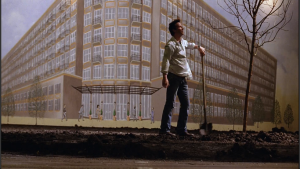 Warner Bros
Warner Bros The tree is a metaphor for branching timelines, because it has branches. Unless it’s a metaphor for love or some shit, I guess.
Okay, okay, but at least it would explain how Alex is saved – he really did die, just in a bunch of earlier timelines before he and Kate created a new timeline in which he doesn’t. But… Kate still remembers. She still remembers him dying.
No, none of this makes sense. It’s clearly just one timeline, which doesn’t make sense but whatever. Unless time takes the form of some kind of incomprehensible yoga-like position in this universe, it seems to be just one timeline, which Kate and Alex are irrevocably altering.
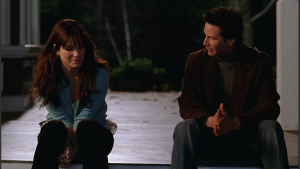 Warner Bros
Warner Bros Look at these two, not giving a fuck about time stability. One little mistake and they’ll butterfly effect us all into fish mutants.
At no point does the box just manifest in front of Kate, as does the tree and, well, Alex’s non-deceased state of being. The box is already there in the past when Kate gets there. It’s part of what prompts her to write her first letter. But in writing this letter, she influences Alex’s decision, in the past, to leave that box there. That just doesn’t seem to fly with the notion that the past is changing. It’s closer to an ontological paradox.
We could argue that Alex didn’t think about the letter when he left that box there, but what other reason would he have to leave it there? Furthermore, he was still thinking about Kate and trying to get back together with her, as evidenced by the fact that he built that book into the floor of the apartment he knew she would end up renting – which, by the way, seems to manifest like the tree, because how else would Kate miss that hollow floorboard in the middle of her room for so long until it’s plotwise convenient for her to find it?
If that box alone isn’t enough to prove the inconsistency here, there’s also the fact that Kate remembers her first kiss with Alex… which only occurred because he’d been corresponding with her via the magical timey-wimey mailbox. Following the logic of the tree and the prevention of Alex’s death, she should never remember having met Alex. Until…
Oh, fuck.
Until he mentioned the event in a letter.
This is bullshit, I’m done.
…It’s not a bad movie, though. Just focus on the romantic drama and don’t try to figure out the logistics behind it all. I’m pretty sure that’s exactly what the writers did.
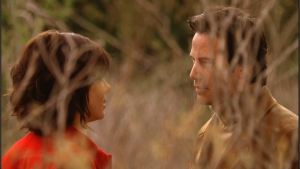 Warner Bros
Warner Bros In the end, they porked, and that’s all that matters.
